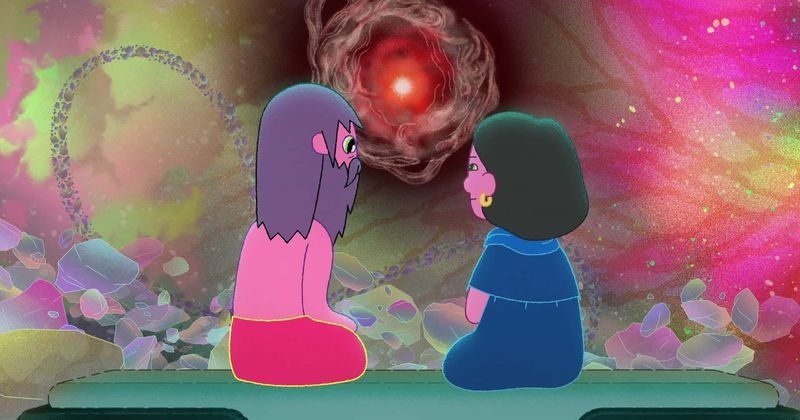The Cosmic Kitsch of Netflix’s "The Midnight Gospel"
Spirituality meets absurdity in one of Netflix's best new series.
In The Midnight Gospel, Clancy, the doe-eyed hero of Netflix's strangest new show, travels to simulations of other universes by way of a half-functional "simulator."
By climbing into a machine that's visually reminiscent of a woman's private parts, Clancy can be transported to weird, occasionally sublime universes, where he inevitably finds a wise new friend to interview for his "spacecast" as the world burns around him.
If the show's premise sounds disjointed, that's because it is. Most of the dialogue in each episode is actually taken from a podcast called Duncan Trussell Family Hour, which consists of a guy named Duncan Trussell (also the voice of Clancy) having deep, frequently personal conversations with a variety of spiritual thinkers, philosophers, and friends.
The show places the audio—which is often serene, if cerebral and psychedelic—above sometimes unbelievably disturbing animation. The show was conceptualized and drawn up by Pendleton Ward, the creator of Adventure Time, and you can see that he completely let loose on The Midnight Gospel. There are gigantic zombies that swivel back into babies; characters die brutally and then are reborn only to die brutally once again. As Clancy and his simulated companions walk to some unknown destination, the world burns around them.
At one point, Clancy talks to Anne Lamott (who appears as a giant dog), and she delivers gems about mental illness and the trope of the suffering artist. Then there's a particularly strange episode where Clancy rides on a ship led by cats whose captain is a fish bowl with a human body attached. The fish in the fish bowl is a magician, voiced by Damien Echols, and they discuss magic and spirituality and the labyrinthine nature of spiritual paths. There's a moving episode about the importance of forgiveness, which ends up reaching the conclusion that community-building is a spiritual practice. There's one about how to meditate, and one about coping with grief and death.
If you can get past the sheer strangeness of the subject matter and presentation, The Midnight Gospel is immensely rewarding. The conversations are often cathartic, full of insights and love. There's also useful advice about mindfulness and about watching your emotions instead of identifying with them.
I tried to persuade my family to watch the show, but they said it was "a bit too weird" and politely retreated whenever I put it on. But for me, it was just the right amount of weird. After all, the real world outside is gory and nonsensical and brutal and beautiful, just like the insane animation on the show. Yet in the midst of it, the poetic and philosophical connections always seem to emerge during the worst storms. In its surreality, the show feels like an accurate depiction of reality.
Midnight Gospel covers all those ideals and more, often blazing through them at warp speed. Despite the maximalism of its concepts and color palate, there's something small and almost cozy about it all. Maybe that's because Clancy lives in a tiny trailer, spending his time turning his audio recordings into synths songs.
Or maybe that's because despite its otherworldly themes, The Midnight Gospel is mostly about private grief. In the last episode, what you hear is the actual audio of Trussell speaking to his mom three weeks before she died of cancer. His mother, Deneen Fendig, takes Clancy on a journey through time and space. At the end of her life, she seems to have achieved an almost transcendent state of understanding. It's the closest any of the characters on the show get to the enlightenment they so often speak about.
As they talk, Clancy and his mother grow old and then young, aging in cycles and in reverse. They turn into planets, join the cosmos, dissolve into pieces, and fade back into the ether. At last, Clancy breaks down and cries. All of his wandering and his other simulated worlds were really just attempts to run from the challenges of his own world.
In the fifth episode, Clancy reaches a world where a prisoner keeps nearly escaping over and over again, only to die brutally, ending up where she began. But at the end of the show, she ends up making it out and winds up in a weird cosmic palace where she sings a beautiful song. "Drinking blood from the stump of a prison guard that I just chopped up," she sings, voice light and full. "That used to be freedom to me. But now I see… the prison was inside of me, and I was really pissing in my own gouged-out eye."
It's classic Midnight Gospel: violent but full of poetic insights and moving downloads. And who among us can't relate even a little to Clancy, running from his grief by throwing himself into ever-stranger realities, getting lost on the path to spiritual transformation? In a time of loss, Midnight Gospel offers medicine for late nights and visions of a world as broken and fantastic as our own.
